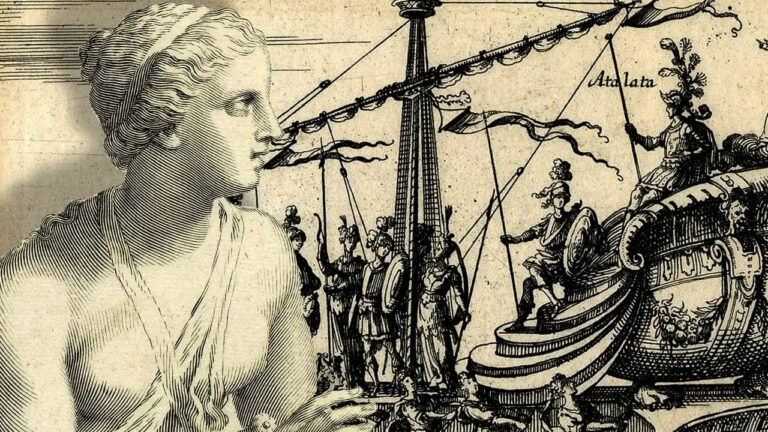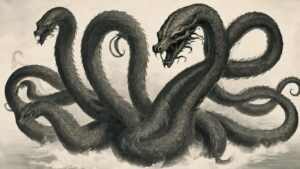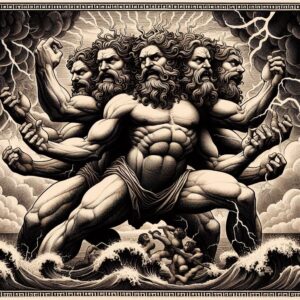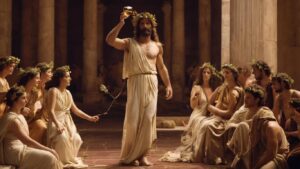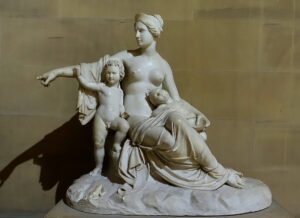Table of Contents
Who is Atalanta
Atalanta is a figure from Greek mythology. She is a renowned and swift-footed huntress, often depicted as a skilled archer and a beautiful maiden. Atalanta is best known for her involvement in the Calydonian Boar Hunt and for her participation in the Argonauts’ quest for the Golden Fleece.
According to one myth, Atalanta was abandoned by her father, who wanted a son instead of a daughter. She was then raised by a she-bear and later discovered and taken in by hunters. She grew up to be a formidable and independent young woman, known for her hunting prowess.
Atalanta’s most famous adventure was the Calydonian Boar Hunt, in which she joined other heroes, including Meleager, to hunt a monstrous boar sent by the goddess Artemis to punish the king of Calydon. Atalanta played a crucial role in the hunt and was eventually the one to land the fatal arrow on the boar.
She also took part in the Argonauts’ quest for the Golden Fleece. During this journey, Atalanta faced various challenges and adventures alongside other legendary heroes like Jason.
Atalanta’s story is often cited as an example of a strong and independent female character in Greek mythology. Her feats in hunting and bravery set her apart in a world where heroes were typically male.
Origin

Atalanta’s origin lies in Greek mythology, where she emerged as a renowned and swift-footed huntress. Abandoned by her father who desired a son, Atalanta was left to be raised by a she-bear before being discovered and taken in by hunters. Growing into a formidable and independent young woman, she gained fame for her exceptional hunting skills. Her most notable exploits include her pivotal role in the Calydonian Boar Hunt, where she, along with other heroes, hunted down a monstrous boar sent by the goddess Artemis. Atalanta also participated in the Argonauts’ quest for the Golden Fleece, facing numerous challenges alongside legendary heroes like Jason. Atalanta’s story stands as a testament to her strength and independence in a mythological world dominated by male heroes.
Calydonian Boar Hunt
The Calydonian Boar Hunt is a famous episode in Greek mythology, involving a heroic hunting expedition led by King Oeneus of Calydon. The story is prominently featured in various ancient texts, including those by Ovid and Homer.
The tale begins when Oeneus fails to honor the goddess Artemis appropriately during harvest, neglecting to dedicate the first fruits to her. In retaliation, Artemis sends a massive and ferocious boar to ravage the land of Calydon. The boar becomes a dangerous menace, destroying crops and causing havoc.
In response to the crisis, Oeneus calls upon a group of renowned heroes to join forces and hunt down the Calydonian Boar. The assembled group includes famous figures such as Meleager, Atalanta, Jason, and Castor and Pollux (the Dioscuri), among others.
Atalanta, the skilled huntress, plays a significant role in the hunt. She is often highlighted for her bravery and exceptional archery skills. Meleager, the son of Oeneus, eventually kills the boar, and a dispute ensues over the spoils of the hunt. Tragically, the conflict leads to Meleager’s death.
The Calydonian Boar Hunt is a popular theme in art and literature, symbolizing the heroic virtues of bravery and cooperation. It is also noteworthy for featuring Atalanta as a central and formidable figure in the group of mythic hunters.
The Race
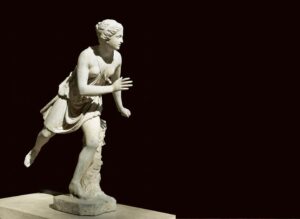
The story of the race involving Atalanta is a notable part of her mythology, demonstrating her speed and determination. In this myth, Atalanta, a swift and skilled huntress, made a vow of virginity and declared that she would only marry a man who could outrun her in a footrace. Suitors from various regions tried to win her hand in marriage, but Atalanta, being exceptionally fast, easily defeated them.
Hippomenes, also known as Milanion, was determined to marry Atalanta and sought the help of the goddess Aphrodite. Aphrodite provided him with three golden apples and instructed him on how to use them strategically during the race. When Atalanta and Hippomenes raced, he rolled the golden apples in front of her. Intrigued by the shiny and valuable fruits, Atalanta slowed down to pick them up, giving Hippomenes the opportunity to win the race.
As a result, Atalanta and Hippomenes married. However, they later faced the wrath of the gods for engaging in intimate relations within a sacred temple. In some versions of the myth, they were transformed into lions as punishment.
The race between Atalanta and her suitors, particularly the one with Hippomenes and the golden apples, is a well-known episode that highlights themes of love, competition, and the intervention of the gods in Greek mythology.
Modern Influence
Atalanta’s story and character from Greek mythology have influenced various aspects of modern culture, including literature, art, and even sports. Here are a few examples of how Atalanta’s legacy continues to resonate:
Literature and Art:
Reinterpretations in Fiction: Authors and artists have often reimagined or retold Atalanta’s story in contemporary literature and art. These reinterpretations explore themes of gender, identity, and empowerment.
Feminist Themes: Atalanta is sometimes seen as a symbol of female strength and independence, making her a source of inspiration for feminist interpretations and discussions in modern literature.
Sports:
Athletic Inspiration: Atalanta’s reputation as a skilled and swift huntress has made her a symbolic figure in discussions about women in sports. Her story is sometimes invoked to inspire and celebrate the achievements of female athletes.
Team Names and Symbols: In the world of sports, the name “Atalanta” has been adopted by various teams. For example, Atalanta B.C. is a professional football club based in Bergamo, Italy.
Business and Branding:
Brand Names: The name “Atalanta” is sometimes used in business and branding, drawing on its associations with speed, agility, and strength. Companies may adopt the name to convey qualities they want to associate with their products or services.
Entertainment:
Film and Television: Atalanta’s character or elements of her story may be adapted or referenced in films, TV shows, and other forms of entertainment, contributing to the ongoing popularity of Greek mythology in modern media.
Literary Analysis and Academic Studies:
Academic Discourse: Atalanta’s character is often analyzed in academic studies and literary courses, providing scholars and students with a rich source for discussions on mythology, gender studies, and classical literature.
The enduring appeal of Atalanta in modern times underscores the timeless nature of her story and its ability to inspire discussions on various aspects of the human experience.
Atalanta FAQ
Who is Atalanta?
Atalanta is a figure from Greek mythology, celebrated for her exceptional skills as a huntress. She is known for her participation in the Calydonian Boar Hunt and the Argonauts' quest for the Golden Fleece. Atalanta is also famous for her vow of virginity and the footrace through which she sought a suitor.
Into what are Atalanta and her husband transformed and why?
In some versions of the myth, Atalanta and her husband, Hippomenes, are transformed into lions. This transformation is a punishment from the gods for the couple's act of engaging in intimate relations within a sacred temple.
Who played Atalanta in Hercules?
In the 1997 Disney animated film "Hercules," Atalanta is a minor character with no significant voice role or credited actor for her character.
How did Atalanta die?
The death of Atalanta varies in different versions of Greek mythology. There isn't a consistent account of her death, and some myths do not provide details about the end of her life.
Why was Atalanta a hero?
Atalanta is considered a hero in Greek mythology due to her exceptional skills as a huntress, her bravery, and her participation in heroic quests such as the Calydonian Boar Hunt and the Argonauts' quest for the Golden Fleece. Her independence, strength, and courage set her apart in a world where heroic deeds were typically attributed to male characters.
Which archetype best fits Atalanta?
Atalanta is often associated with the archetype of the "Independent Woman" or the "Strong Female Hero." Her determination to remain independent, her exceptional skills in hunting, and her resistance to traditional gender roles contribute to this archetype.
Which character archetype fits the character of Atalanta best?
The "Outsider" archetype could also be fitting for Atalanta. As someone who was abandoned as a child, raised by a she-bear, and later embraced a life of independence, she doesn't conform to societal norms. Her outsider status contributes to her unique character and sets her on a distinct path in Greek mythology.
